|
|
 |
 |

 |
 |
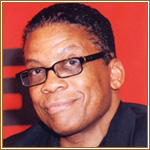 Herbie Hancock, a child prodigy, began his professional career in 1960 when he was discovered by trumpeter Donald Byrd, who asked him to join his group. Byrd also introduced Hancock to Alfred Lion of Blue Note records, and after two years of session work, he signed to the legendary label as a solo artist. His 1963 debut album, Takin' Off, was an immediate success, producing "Watermelon Man", an instant hit at jazz and R&B radio. 1963 also brought Hancock the call that was to change his life and fix his place in jazz history. He was invited to join the Miles Davis Quintet. During his five years with Davis, Hancock and his colleagues thrilled audiences and recorded classic after classic, including albums like ESP, Nefertiti, and Sorcerer. Herbie Hancock, a child prodigy, began his professional career in 1960 when he was discovered by trumpeter Donald Byrd, who asked him to join his group. Byrd also introduced Hancock to Alfred Lion of Blue Note records, and after two years of session work, he signed to the legendary label as a solo artist. His 1963 debut album, Takin' Off, was an immediate success, producing "Watermelon Man", an instant hit at jazz and R&B radio. 1963 also brought Hancock the call that was to change his life and fix his place in jazz history. He was invited to join the Miles Davis Quintet. During his five years with Davis, Hancock and his colleagues thrilled audiences and recorded classic after classic, including albums like ESP, Nefertiti, and Sorcerer.

Since that auspicious beginning, Hancock has been at the forefront of every major electronic and acoustical movement to expand and explore the jazz genre. No stranger to career accolades, Herbie won the 1987 Academy Award for his soundtrack to the film "Round Midnight". He won 10 Grammy Awards, including two for his 1998 classic Gershwin's World and two for the 2002 release Directions in Music, as well as countless other awards for his contributions in the entertainment industry.

In 1996, Herbie founded the Rhythm Of Life Foundation, dedicated to finding ways to use technology to address the real issues of humanity and to narrow the gap between those who are technologically empowered and those who are not.

Last year, in 2002, Herbie released a live album, "Directions In Music", as a tribute to the 75th anniversary of the birth of both Miles Davis and John Coltrane, which garnered him the grand prize for Japan Jazz Disc Awards and two Grammy Awards.

Herbie is a true icon of modern music. His explorations have transcended limitations and genres, and at the same time he has maintained his unmistakable voice. Hancock's success at expanding the possibilities of musical thought has placed him in the annals of this country's visionaries. What's more, he continues to be amazed and expand the publics vision of what music is all about today.
As the music producer of the festival, Herbie has been involved in TOKYO JAZZ since its start in 2002.
This will be his 3rd year in putting the festival together as an icon of all music performers around the world.

http://www.herbiehancock.com/ |
| to the top of this page |
 |
 |
 |
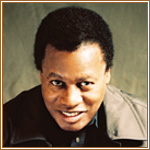 Wayne made his debut with the album, "Introducing Wayne Shorter". At the same time, he was active both as a tenor sax player and musical director for Art Blakey & Jazz Messengers. Since 1964 and on, Shorter joins Miles Davis' group with Herbie Hancock, Tony Williams, and Ron Carter and has cultivated himself to become a leading sax player in the jazz scene. During these six year of the group's activity, Miles Davis Quintet left us with numerous achievements that will go down in the history of jazz. Meanwhile, Shorter has actively engaged in his solo activity and has released 11 solo albums. Wayne made his debut with the album, "Introducing Wayne Shorter". At the same time, he was active both as a tenor sax player and musical director for Art Blakey & Jazz Messengers. Since 1964 and on, Shorter joins Miles Davis' group with Herbie Hancock, Tony Williams, and Ron Carter and has cultivated himself to become a leading sax player in the jazz scene. During these six year of the group's activity, Miles Davis Quintet left us with numerous achievements that will go down in the history of jazz. Meanwhile, Shorter has actively engaged in his solo activity and has released 11 solo albums.

In the 70's, Shorter co-founded Weather Report with Joe Zawinul, also a member of the Miles Davis band, establishing a whole new world of avant-garde future jazz. As a result, the group grew itself to the level where they enjoyed the highest recognition and popularity throughout the music scenes of the 70's. Shorter managed to continue his activities as a soloist, releasing 3 solo albums of his own, not only making a profound impact on the jazz scene at that time but also on subsequent club music. He has won 8 Grammy Awards (incuding "Weather Report" of the ones he has indulged in) in total, up to this point.

Shorter won the following awards in 2003.

| 2003 GRAMMY AWARDS |
Best Jazz International Album Award
Best Instrumental Composition Award |
|
| to the top of this page |
 |
 |
 |
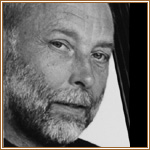 Dave Holland was born in Wolverhampton, England, on October 1, 1946. He was drawn to music at an early age, starting with the ukelele at age 4, moving to the guitar at 10 and then to the bass guitar at 13. Dave Holland was born in Wolverhampton, England, on October 1, 1946. He was drawn to music at an early age, starting with the ukelele at age 4, moving to the guitar at 10 and then to the bass guitar at 13.
Moving to London at 17, he began to receive intense musical experiences. It was during an engagement there in July of 1968 that Miles Davis visited the club, heard Dave playing, and asked him to join his band. Dave moved to New York a few weeks later and for the next two years toured and appeared on a number of recordings with Miles including In A Silent Way and Bitches Brew.

In late 1970 Dave left Miles' band and together with Chick Corea, Anthony Braxton and Barry Altschul founded the group Circle. It was at this time that he started performing on cello as well as bass.

In 1975 he took part in the formation of Gateway, a trio with John Abercrombie and Jack DeJohnette, a fellow band member from the Miles Davis band. Gateway continues to tour and record up to the present time. After working with Betty Carter for a few months in 1976, Dave spent the remainder of the decade working and recording with Sam Rivers. He also recorded an album of solo bass music in 1977 entitled 'Emerald' Tears and began performing solo concerts.

The 1980's started with Dave continuing to work with Sam Rivers, but in 1981 he left the band so that he could turn his attention to putting together his own group. After recording the solo cello album "Life Cycle", he was ready to assemble his first full time working band. The first version of the group was a quintet featuring Kenny Wheeler, Julian Priester, Steve Coleman and Steve Ellington. Later members included Marvin 'Smitty' Smith and Robin Eubanks. The group recorded three groundbreaking albums "Jumpin' In", "Seeds of Time" and "The Razor's Edge" and toured extensively until 1987. Dave also continued with his teaching activities throughout the 1980's. In 1983 he was appointed artistic director of the summer jazz workshop at the Banff School in Banff, Canada, a position he held until 1990, and from 1987 to 1990 he was a full time faculty member of the the New England Conservatory of Music in Boston,
Massachusetts.

In 1992 Dave began appearing as a regular member of Herbie Hancock's trio and also performed on Joe Henderson's Grammy Award winning recording So Near, So Far.
During 1996 Dave took part in a world tour with Herbie Hancock's quartet, and also toured with Gateway and with his own group. He was active in the studio and performed on three grammy nominated albums: Michael Brecker's "Tales from the Hudson", Herbie Hancock's "The New Standard", and Billy Childs' "The Child Within".

Dave Holland has attained a new plateau of public popularity and critical acclaim with his current quintet. Both of the quintet's previous albums, for instance, Points of View and Prime Directive, were Grammy-nominated.

and in 2000 received an Honorary Doctorate from the Berklee School of Music.

|
| to the top of this page |
 |
 |
 |
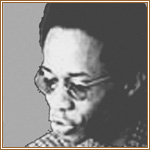 Louisiana-born, Brian Blade grew up in Shreveport, then New Orleans, where he distilled the unique drumming styles and musical heritage of the nation's spiritual underbelly into a powerfully swinging percussive trademark. Nurtured under the watchful eyes of Ellis Marsalis and New Orleans Dixie-drum masters Johnny Vidacovich and Herlin Riley, Blade learned to find his 'knit in the blanket' of sounds and styles. Louisiana-born, Brian Blade grew up in Shreveport, then New Orleans, where he distilled the unique drumming styles and musical heritage of the nation's spiritual underbelly into a powerfully swinging percussive trademark. Nurtured under the watchful eyes of Ellis Marsalis and New Orleans Dixie-drum masters Johnny Vidacovich and Herlin Riley, Blade learned to find his 'knit in the blanket' of sounds and styles.

From albums and tours with Joshua Redman and Kenny Garrett, to recent recordings with Bob Dylan (Time Out Of Mind), Emmylou Harris (Wrecking Ball), Daniel Lanois (Sling Blade) and hero Joni Mitchell, Brian has shown deep musical instincts and a phenomenal gift for playing music texturally -- both thick and thin -- on the drums. His evolution continues on his astounding, highly acclaimed Blue Note debut, Brian Blade Fellowship. The line-up of Fellowship, Brian's band, is as potent as its leader's musical skills: Jon Cowherd, piano and Wurlitzer, Christopher Thomas on bass, Melvin Butler, tenor and soprano sax, Myron Walden, alto sax, Jeff Parker, guitar; and Dave Easley, pedal steel guitar. This self-titled album was produced by Daniel Lanois who also guested on the album playing mando-guitar and Fender Mustang guitar; Mark Howard recorded and mixed at The Teatro in Oxnard, California.

Brian Blade makes music that exists beyond borders. Spirituality, sensitivity, honesty, loyalty, all these traits feed the theme of the Brian Blade Fellowship. "I want the music to be a fellowship. That's what you want from the world as a whole. I want the music to project that kind of togetherness. This ideal of fellowship is something I grew up with. I just want to extend the good memories.
|
| to the top of this page |
 |
 |
 |
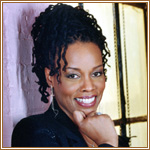 Recognized as one of jazz's pre-eminent vocalists, Dianne Reeves is one of the most significant singers to come into her own in the last ten years. During the same decade that saw the passing of so many great female jazz vocalists-Sarah Vaughn, Carmen McRae, Ella Fitzgerald, Betty Carter and others-a handful of new singers arrived in the '90s to carry the torch into the future. Steeping their voices in the tradition while at the same time taking bold new steps, they found new audiences and assured jazz aficionados that the vocal heritage was in good hands. Recognized as one of jazz's pre-eminent vocalists, Dianne Reeves is one of the most significant singers to come into her own in the last ten years. During the same decade that saw the passing of so many great female jazz vocalists-Sarah Vaughn, Carmen McRae, Ella Fitzgerald, Betty Carter and others-a handful of new singers arrived in the '90s to carry the torch into the future. Steeping their voices in the tradition while at the same time taking bold new steps, they found new audiences and assured jazz aficionados that the vocal heritage was in good hands.

With her strong, agile voice, rhythmic virtuosity, and improvisational ease, Dianne Reeves was clearly born of jazz, but her singing draws upon a world of influences. As with Carmen McRae and Billie Holiday, Reeves' musicianship is tied to a powerful storytelling instinct.

The nobility of her singing is rooted in her childhood. Born in Detroit and raised in Denver, Reeves lost her father when she was two. But the women in her family her grandmother, her mother (a nurse), her aunt, and her sister provided an unshakable sense of security and fortitude.

Music was another family gift. Her father had been a singer; her mother played trumpet; an uncle, Charles Burrell, worked as a bassist with the Colorado Symphony. Further inspiration came from cousin George Duke, the celebrated keyboardist, composer and arranger (and her future producer). As a child Reeves studied piano, the source of her rich harmonic awareness.

Her artistic and emotional grounding helped when she and other black children in Denver participated in one of the first bussing programs, where they were thrust into a pressure-cooker of racism, ignited mostly by parents from a less enlightened time. "It dawned on me that this was truly ignorance, the ignorance of not wanting to understand another," Reeves explains. Then thirteen, she joined black, white, and Hispanic students in trying to educate their elders. She participated in sit-ins, spoke at a school assembly and sang in a concert organized by the children to show how music cuts across racial boundaries. "Fortunately, it ended in a positive way," she says. "People began to take a hard look at themselves and made positive changes."

At sixteen, Reeves put her vocal training on display when she sang with her high school band at a National Association of Jazz Educators convention in Chicago. One of the people who heard her was trumpeter Clark Terry, who invited Dianne to sing with various all-star groups and became the first in her long line of illustrious mentors.

After a few years of singing in local clubs she moved to Los Angeles in 1976, only to find that straight-ahead jazz singing was at a commercial low. That's when she learned to stretch her talent in other directions. She recorded with the Latin fusion group Caldera in which Dianne made a lasting friend: keyboardist Eduardo (Eddie) del Barrio, with whom she has co-written some of her most powerful songs. Reeves also sang with an experimental jazz band with pianist Billy Childs, with whom she has subsequently worked for nearly 25 years.

Dianne recorded her first album, "Welcome to My Love", in 1982. During that time she wrote and recorded "Better Days", a stirring remembrance of her grandmother. Since then Reeves has expanded the song into a gospel-like narrative about her youth. Holly Bass of the "Washington Post" called it "A picture of black Southern life as vivid as any you'd find in a story penned by Maya Angelou or J. California Cooper."

Now a Blue Note Records recording artist, Dianne has recorded a total of fourteen albums and has won three consecutive GRAMMY Awards (2001, 2002 & 2003). Her two latest releases pay tribute to her own musical heritage as well as one of the greatest jazz singers. "The Calling: Celebrating Sarah Vaughn" (2001) pays homage to the esteemed jazz vocalist who inspired Dianne to seriously pursue singing. Recalls Dianne, "I was struck by the sound of her voice-its color, range, the places it went to create feelings. I didn't know the voice could do all that. She changed my way of listening, and all of a sudden I had a place to reach for in my own singing." The Calling features a 42-piece orchestra of L.A.'s top studio musicians and was produced by George Duke and arranged and orchestrated by longtime friend, Billy Childs. Also released in 2001 was "The Best of Dianne Reeves", a 12-song collection that charts her ascent as one of jazz's most important
vocalists.

In 2002, Dianne brought down one of the biggest of houses with her spellbinding performance at the Winter Olympics closing ceremonies. She also appeared and sang in the 2002 season finale of "Sex and the City". In November 2002, Dianne was named Creative Chair for Jazz for the Los Angeles Philharmonic.

Dianne Reeves currently lives in Denver, but spends much of her life on the road. "I really believe in touring," she says. "It's the only way you can get close to your audience."

http://www.diannereeves.com/ |
| to the top of this page |
 |
 |
 |
|
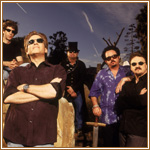 In 1976, Jeff Porcaro and David Paich, who played together in high school bands and are already acclaimed studio musicians and currently working with Boz Scaggs, decide to form a new band. Joining them are Steve Lukather and Jeff's younger brother Steve Porcaro (who have been playing together in a band called Still Life), singer Bobby Kimball (from the L.A. band SS Fools) and bassist David Hungate. Jeff suggests the name "TOTO" after having watched The Wizard of Oz on TV, not to name the band after the dog, but as a name that's easy to pronounce and remember. Coincidentally, "toto" in Latin means "all encompassing", so it is an accurate name for a band who wants to do all kinds of musical styles. In 1976, Jeff Porcaro and David Paich, who played together in high school bands and are already acclaimed studio musicians and currently working with Boz Scaggs, decide to form a new band. Joining them are Steve Lukather and Jeff's younger brother Steve Porcaro (who have been playing together in a band called Still Life), singer Bobby Kimball (from the L.A. band SS Fools) and bassist David Hungate. Jeff suggests the name "TOTO" after having watched The Wizard of Oz on TV, not to name the band after the dog, but as a name that's easy to pronounce and remember. Coincidentally, "toto" in Latin means "all encompassing", so it is an accurate name for a band who wants to do all kinds of musical styles.
In September 1977, their first self-titled album is released and the debut single "Hold The Line" rapidly climbs the charts. With two more hit singles, "I'll Supply The Love" and "Georgy Porgy", TOTO's debut album sets new standards in pop/rock music at that time and earns them a Grammy nomination in 1978 as "Best New Artist".
In 1979, TOTO releases their second album Hydra. It features one of their biggest hits, "99", a song inspired by the George Lucas movie THX- 1138 about a society where people had numbers instead of names. The video for "99" looks exactly like a scene from the movie, an all white room with the band members all dressed in white.
The 1981 album, Turn Back, produces no hit singles, but 1982 marks the biggest year in TOTO's career. The album TOTO IV goes platinum and the hit singles from this album, especially "Africa" and "Rosanna", become classics and make TOTO a household name around the world. Before the TOTO IV tours begin, David Hungate leaves the band and is replaced by the third Porcaro brother, Mike.
In 1983, while their 4th album is still selling millions all over the world, TOTO is the big winner at the Grammy Awards. They receive 6 golden gramophones for Album Of The Year - TOTO IV, Record Of The Year - Rosanna, Producer Of The Year - TOTO, Best Instrumental Arrangement Accompanying Vocals - Rosanna, Best Vocal Arrangement - Rosanna and Best Engineered Recording - TOTO IV. Steve Lukather also wins a Grammy for Best Rhythm & Blues Song - Turn Your Love Around which he co-wrote with Jay Graydon and Bill Champlin.
After TOTO's big world tour, during pre-production of the 5th album, Bobby Kimball leaves and is replaced by Fergie Frederiksen from the band Le Roux. Isolation is released in early 1984 and features two hit singles, "Stranger In Town" and "Holyanna". This album becomes a favorite among the fans. In summer of 1984, TOTO records an instrumental for the Olympic Games, the boxing theme called "Moodido". TOTO also writes their first, and to this date only, movie score for David Lynch's Dune, a monumental sci-fi movie.
In 1985 TOTO participates on the charity album USA For Africa. After yet another change of lead singer, TOTO releases their 6th album Fahrenheit in 1986, with the voice of Joseph Williams, son of famous film composer John Williams. The big hit single from that album, "I'll Be Over You", is sung by Steve Lukather however. Steve Lukather does some shows in Japan with Jeff Beck and Santana, where he meets Simon Phillips for the first time. In support of the Fahrenheit album, TOTO goes on a big world tour that is continued in the spring of 1987.
In 1987, Steve Porcaro officially leaves the band to pursue other projects but continues working with TOTO on their next album, appropriately titled The Seventh One. Returning to the sounds of the TOTO IV era, this albums scores two hit singles in Europe, "Pamela" and "Stop Loving You" (the latter not being released in the U.S.). With the release of the album in 1988, TOTO embarks on another world tour. After the tour, Joseph Williams leaves the band.
Steve Lukather releases his first solo album simply called Lukather in 1989, showing his fondness for harder edged sounds. In support of the album, he tours Japan with Jeff Beck. Also this year, Los Lobotomys, a band consisting of some of the finest L.A. musicians, releases a live album which features Luke and Jeff.
TOTO gets together again in 1990 for a greatest hits compilation called Past to Present. Their plan is to have Bobby Kimball come back and they actually record some songs for that album with him, but the record company forces them to use Jean-Michel Byron as new lead singer. Four new songs featuring Byron are included on the album, but he lasts only for this one album and the following tour when it becomes clear to band and fans that he isn't the right person to front TOTO. Despite all these problems, the first single "Out Of Love" becomes a small hit in Europe while the album goes platinum in most countries.
After the departure of Byron in 1991, Steve Lukather takes over the role of lead singer. TOTO starts writing songs for their next studio album and performs some of them at various summer festivals in Europe, including the Montreux Jazz Festival.
On 5 August 1992, only a short time before the release of the new album Kingdom of Desire, Jeff Porcaro dies of a heart attack after an allergic reaction to a pesticide he was spraying in his garden. Family, band, friends, fans and the whole music world mourns the death of a man who was praised not only as the best drummer around but also a wonderful human being.
With the release of the new album and an already booked world tour just a few weeks away, TOTO makes the hard decision to go ahead with the tour because they feel Jeff would want them to. Simon Phillips bravely takes on the burden of sitting in on drums. The KOD tour becomes a very special tour for band and fans since nobody knows at this point if it will be their last tour. TOTO performs for more than three hours each night, playing songs from every album. Simon Phillips is well integrated into the band and is eventually asked by TOTO to join them permanently.
After returning from the KOD world tour, TOTO starts working on their first live album, which is released in 1993. Titled Absolutely Live, it features some of the highlights from their last tour. Steve Lukather spends the year recording his second solo album Candyman, which is actually a group effort from his other band Los Lobotomys, but released as a solo album in Europe and Japan in 1994. With Simon Phillips, David Garfield and John Peña at his side, Luke goes on an extensive and successful club tour through Europe and Japan in the summer and fall of 1994.
In 1995, TOTO writes and records their first album with Simon Phillips on drums. They play some of the summer festivals in Europe where they present three of their new songs which are very much acclaimed by the fans. Tambu is released in the fall and the first single "I Will Remember" goes gold in several European countries and Japan. Unfortunately, Simon is not able to make it to the first leg of TOTO's world tour due to severe back problems. He is temporarily replaced by Gregg Bissonette, but returns in early 1996 for the second leg. TOTO spends the whole spring and summer of that year touring around the world, from Europe to Japan, South America and back to Europe, where they open for Tina Turner in England in addition to doing their own shows. After returning home, TOTO takes a break which the individual members use for pursuing solo projects.
In the fall of 1996, Simon Phillips releases the solo album Symbiosis which is supported by a European tour in January and February of 1997. Right after that, he starts working on his next solo album and returns to Europe in the summer for some festival appearances. Mike Porcaro teams up with brother Steve to work on a Porcaro Brothers project which generates the single "Young At Heart" with Joseph Williams on vocals, the official song for the European Football Champions League final at which they also perform this song.
Steve Lukather finishes up his third solo album, appropriately titled LUKE, in the spring and takes it on the road throughout the summer, playing ten weeks in Europe followed by another two weeks in Japan. In August David Garfield releases the long-awaited Tribute to Jeff album, featuring nearly 80 musicians, including all of Jeff's TOTO bandmates as well as his family and friends. In late 1997, Steve Lukather and David Paich start searching through old tapes for material for the upcoming 20 year celebration album TOTO XX. Simon Phillips releases Another Lifetime in September and embarks on a short tour of Japan in October before rejoining TOTO for their first ever tour of South Africa in November. TOTO plays big stadiums and is joined by a South African choir and South African drummers to perform "Africa" in Johannesburg.
In January and February of 1998, Simon Phillips tours Europe while the rest of the band puts the finishing touches to TOTO XX. In late February, Steve Lukather comes to Europe to perform at the Jimi Hendrix Tribute Festivals. In May, TOTO XX is finally released. It rapidly climbs the European and Japanese charts. To celebrate the release of this album, TOTO teams up with their ex-members Bobby Kimball, Joseph Williams and Steve Porcaro for some special press parties in Europe, performing all of their old hits with their original singers and also some songs they haven't played in ages. Right after their return home, they start working collectively on their upcoming new studio album. Since they had so much fun with the ex members in Europe, TOTO decides to continue working with them on the new album and even to take Bobby Kimball on the road with them for their next world tour. In November, taking a short break from recording the new TOTO album Mindfields,
Steve Lukather tours Japan with guitar legend Larry Carlton, while Simon Phillips works on an upcoming live album compiled from his recent solo tours.
To coincide with the release of the new album Mindfields in March of 1999, TOTO embarks on a big world tour in late February. After more than two highly successful months in Europe they go on a completely sold out Japanese tour in April. In May, TOTO starts their first U.S. tour in six years which is continued throughout the summer.
In July, Simon Phillips releases a live album called Out Of The Blue, recorded during his 1998 European tour. TOTO starts mixing their new live album, appropriately titled LIVEFIELDS, in August. In September, Steve Lukather takes part in the Linzer Klangwolke, a big open air event in Austria. Right in time for the start of the second European leg of the big world tour, the long-awaited live album LIVEFIELDS is released in Europe in early October. After some more U.S. dates in December TOTO wraps up the year with a performance on the "Mark & Brian Christmas Show".
The new millennium starts with a Grammy nomination for TOTO. Mindfields is nominated in the category of "Best Engineered Album, Non-Classical". In late January/early February, Steve Lukather does a short Japanese tour with Edgar Winter, while TOTO hits the road again some weeks later for more U.S. West Coast dates. Simon Phillips releases an acoustic Jazz album together with Jeff Babko called Vantage Point in April. After a short Central America tour and some more U.S. shows, TOTO (with Jeff Babko temporarily replacing David Paich) returns to Europe for a festival tour in June which they continue in August. In between, Steve Lukather teams up with Edgar Winter again for a European tour during July. After almost two years of touring, TOTO takes a break which the band members use to work on other projects. Simon Phillips does a short clinic tour in England in fall, while Steve Lukather mixes the upcoming Luke/Carlton live album. David Paich writes
and produces the new Boz Scaggs album and also continues working on the long term TOTO box set project.
Simon Phillips and Jeff Babko take their Vantage Point project to the road in January 2001, touring Europe for two weeks. Together with Steve Lukather and Melvin Davis they also form a new band called Doves of Fire which plays 70's fusion music. In late March, Steve Lukather starts a tour of Asia with Larry Carlton to coincide with the release of their live album No Substitutions. Luke and Larry continue their world tour with a US leg in May and June, shortly interrupted by two TOTO shows in Las Vegas on Memorial Day weekend, before leaving for a European tour in July. In August and September, TOTO continues to play some shows in the U.S. and also open for Eric Clapton in Mexico in October. In November, TOTOs start recording a new album.
The new year starts with two Grammy nominations for Steve Lukather and Larry Carlton of which they end up winning one for Best Pop Instrumental Album - No Subsitutions (Live in Osaka). Luke and Simon's new band Doves of Fire tours Japan in February, and after their return TOTO puts the finishing touches to the upcoming new album Through The Looking Glass.
In June, Steve Lukather records a Christmas album called SANTAmental which features a lot of special guest musicians. After returning from a short European festival tour in July, TOTO sign a new worldwide recording deal with CMC, a division of EMI Recorded Music, to release Through The Looking Glass on October 14th. The first single "Could You Be Loved", written by Bob Marley, is released to radio stations in September. After the release of Through The Looking Glass, which rapidly climbs the European charts, TOTO embark on their 25th anniversary world tour in late October which starts with a European leg and then continues until the end of December with lots of dates in the Far East.
In January 2003 TOTO continue their world tour in Europe and film a live DVD at the Amsterdam show to be released later that year. Luke and Simon team up with Derek Sherinian again for his latest album. After the end of the second European leg in February, Simon starts mixing the upcoming live DVD which he finishes after TOTO's US tour in April. In June and July, TOTO hit the road again for the third European leg of the world tour. After a trip to Tahiti and New Caledonia TOTO take part once again in the Night of the Proms concert series which lasts from October to the end of December.
TOTO continue touring in early 2004, visiting South East Asia, South America and Mexico before returning to the US in May. They play two full shows with the Honolulu symphony orchestra in Hawaii.
http://www.toto99.com/
|
| to the top of this page |
 |
 |
 |
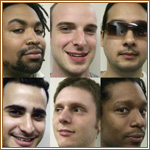 The Thelonious Monk Institute Ensemble is comprised of six talented musicians
attending the Thelonious Monk Institute of Jazz Performance at the University of
Southern California. This two-year, full scholarship program accepts the most talented
young jazz musicians from around the world to study with the architects of jazz. The Thelonious Monk Institute Ensemble is comprised of six talented musicians
attending the Thelonious Monk Institute of Jazz Performance at the University of
Southern California. This two-year, full scholarship program accepts the most talented
young jazz musicians from around the world to study with the architects of jazz.

The students are selected by Institute Chairman Herbie Hancock, Artistic Director Terence Blanchard, and former Artistic Director Ron Carter. They study with renowned artists such as Clark Terry, Dave Holland, Kenny Barron, John Scofield and others.

They also pass on their knowledge through educational programs conducted at Los Angeles high schools. Additionally, they perform around the world at festivals and cultural events.

James "Mikey" Alsanders, drums, was born in 1978 in New Orleans. He began playing
the trumpet at the age of eight and the drums at age 16. He is a graduate of NOCCA, the New OrleansCenter for the Creative Arts, and he has studied at the Berklee College of Music. Musicians he has performed with include Terence Blanchard, Donald
Harrison, Ellis Marsalis, Delfeayo Marsalis, and Nicholas Payton, as well as ensembles
such as the Atlanta Symphony Orchestra and the Utah Symphony.

Alan Hampton, bass, was born in Houston, Texas in 1981. A student at the Houston
School of Performing and Visual Arts, he began playing upright bass at age 17. Alan
began attending the New School for the Arts in New York City in 2000. He has appeared
on several albums such as that of Blue Note recording artist Jason Moran. He has also
recorded with Eri Yamamoto for his latest recording, Three Feel, as well as contributing the original composition "Velvet." Recently, the Mark Turner Trio performed his composition "Texas Twist" at the Village Vanguard in New York.

Arpad "Tzumo" Olah, piano, was born in Hungary in 1980. He began playing piano at age seven and continued at the Ferenc Erkel Jazz High School in Budapest and at the Leo Weiner Classical Conservatory. In 1998 he won the Radio Jazz Piano Competition, followed by first place in the Jazz Under Dunau Competition of Germany in 2001. In 2002 he won first prize for Best European Soloist and Best Trio in the Belgium Jazz International Hoeliart Competition. In the fall of 2002, he received a scholarship award to attend the Berklee College of Music, where he studied under JoAnne Brackeen and
played in the Hal Crook band.

Gilad Ronen, saxophone, was born in Israel in 1979. In 1997 he graduated with honors from the Thelma-Yalin School of the Arts in Tel-Aviv. Competitions he has won include the Yamaha Young Performing Artist Competition and the America-Israel Art Foundation Award. Following his studies in Israel, he relocated to Boston, where he was awarded the prestigious Alma & Lee Berk Full Tuition Scholarship to study at the Berklee College of Music. During his studies at Berklee, he received the Frederick Cameron Weber Award for outstanding achievement and musical contribution to the school in 2002. He has also participated in the highly selective program at the Henry Mancini Institute. In addition, Gilad is the leader of Na-Na, a musical group that performs his own original compositions.

James Westfall, vibraphone, was born in and raised in Houston, Texas. He began playing piano at the age of 12 and vibraphone at the age of 15. James attended the Houston High School of Visual and Performing Arts. After graduation he enrolled at the University of New Orleans. He was the winner of the Svenson Composition Award in 2001 and 2002. He has performed with Ellis Marsalis, Shania Twain and the Houston Symphony Orchestra. James has also appeared at the New Orleans Jazz and Heritage Festival and performed the music for major television commercials.

Dontae Winslow, trumpet, was born and raised in Baltimore, Maryland. He attended the Baltimore School for the Performing Arts and the New School for Social Research in New York, and ultimately received his Bachelor of Arts degree in Classical Music Performance and Masters degree in European Classical Music from the Peabody Conservatory at Johns Hopkins University. He has performed at the Columbia Arts Festival, Montreux Jazz Festival, the Montreal Jazz Festival, the Brecon Jazz Festival and the Marciac Jazz Festival. In addition, he has performed with such musicians as Roy Hargrove, Wynton Marsalis, Milt Jackson, The Roots, Clark Terry, and Stevie Wonder, as well as the Baltimore Symphony Orchestra. Dontae takes pride in educating children, and his song "I Love School" was the grand prize winner of the 2002 John Lennon Songwriting Contest in the children∂s music category.
|
| to the top of this page |
 |
 |
 |
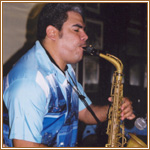 Well-known Cuban musicians founded "HABANA ENSEMBLE" at the beginning of 1997. They had in their formulation a series of novel musicians from the musical and aesthetic point of view that differentiate Habana Ensemble from other Cuban groupings. Well-known Cuban musicians founded "HABANA ENSEMBLE" at the beginning of 1997. They had in their formulation a series of novel musicians from the musical and aesthetic point of view that differentiate Habana Ensemble from other Cuban groupings.

These musicians had Irakere as school, under the direction of the famous jazziest Chucho Valdés. This fact make that these young talents arrive to the maturity mastering their instruments, and their incursions in the Latin jazz would be in several occasions samples of virtuosity.

Using the individual possibilities of each one of their members, “HABANA EMSEMBLE” makes a coalition with classic jazz repertoire and Cuban popular music. They achieve a contemporary sound that makes them authentic in each one of their interpretations.

“HABANA ENSEMBLE” opted since its beginnings to show the public versatility and scenic unfolding due to a repertoire conformed by boleros, salsa, instrumental, congas, and versions of some standard jazz. Improvisations play a decisive role in each one of their members. They are led by Cesar López - saxophonist of a high technical and professional level (former member of Irakere), classified by the critic as the Cuban Charlie Parkes.

Expressing feelings and emotions that transcend in the most universal language that is the music, is the greatest achievement of Habana Ensemble. This is done through a study of the Cuban musical history and of the contributions that have been made in the last 20 years and starting from the above-mentioned to achieve a sonority and style that defines them before an avid public and expert. They has measured their quality in national and international Festivals, as well as in scenarios of Venezuela, Barbados, San Martin, Peru, Colombia, United States, Brazil, Argentina, Mexico, Francia, Reino Unido, Sudáfrica, etc, just to mention some examples, where they have been acclaimed by the specialized critic and the public.

“HABANA ENSEMBLE “ has shared the stage with Víctor Manuel, Dany Rivera, Washington Bridges Ballet, Ed Motta, Iván Lins, Spiro Gira, Marcos Miller, Fumio Karachima, El Cigala, Chucho Valdés, Compay Segundo, Richard Egues among others.

Virtuosity, originality and mainly desires to give a musical project of high aesthetic content, are the qualities that distinguish to “HABANA ENSEMBLE”, Cuban musical grouping that already occupies an important place in the history of the Latin Jazz.
|
| to the top of this page |
 |
 |
 |
 Reel People is a two-man unit made up of Oli Lazarus, owner of London’s Papa Records, which is know for releasing high quality UK house music, and multi-keyboardist Mike Patto, who is a member of Restless Soul led by Phil Asher and has participated in numerous productions in West London. Reel People is a two-man unit made up of Oli Lazarus, owner of London’s Papa Records, which is know for releasing high quality UK house music, and multi-keyboardist Mike Patto, who is a member of Restless Soul led by Phil Asher and has participated in numerous productions in West London.

Their first album “Second Guess” gathered a great deal of attention with its lineup of top-level guests.

The album features an ensemble of gifted artists active at the forefront of the current music scene including vocalists Vanessa Freeman, known for her guest appearances on the productions of numerous notable dance music producers, Angela Johnson of Cooly’s Hot Box and Shelly Nelson, who is also featured on an album by Nathan Haines, drum programmers such as top-level producers Phil Asher, Seiji and DJ Spinna, and numerous musicians such as Nathan Haines.

The album, which has yielded a number of hit songs including “Can’t Stop,” “The Light” and “Butterflies” in addition to a title track which became a smash hit in clubs around the world, has received rave reviews as one of the best works of club music in 2003.
|
| to the top of this page |
 |
 |
 |
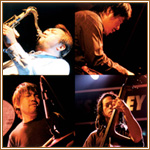 Osamu Koike (sax), Makoto Aoyagi (p), Koichi Osamu (b), Masahiko Osaka (ds) Osamu Koike (sax), Makoto Aoyagi (p), Koichi Osamu (b), Masahiko Osaka (ds)

EQ released its second album, “Imperfect Completeness,” in May 2004.
The group is made up of four extremely high-caliber musicians who joined forces with the hope of creating a new jazz scene. Osamu Koike (saxophone) has appeared on over 2,000 albums. Makoto Aoyagi (piano), who made his debut with Naniwa Express, one of the top bands in the Kansai area, has recently also been active as a producer. Koichi Osamu (bass), who won the Eddie Gomez Award while studying at Berklee College of Music, is well-known as a sideman for Sadao Watanabe. Masahiko Osaka (drums) has received countless awards in the jazz world and earned the trust of musicians around the world including Duke Jordan, Dusko Goykovich and Delfeayo Marsalis. The band’s name stands for both “equalizer” and “Earth Quartet” and means “a next-generation group (quartet) conscious of the global environment.” EQ performs straight-ahead jazz based on the concept of “creating an acoustic and heartwarming sound” with a focus
on originals. No one member of EQ is the leader, but rather the group thinks of itself as an ensemble, with the musical sense of each of its four members guiding the way. With the combination of these four members, EQ delivers a truly outstanding sound.
|
| to the top of this page |
 |
 |
 |
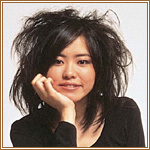 Born in 1979, currently 25 years of age. Began to take up the piano at age six, and learned to compose as a student of Yamaha School of Music simultaneously. Performed numerously in concerts such as "UNICEF Charity Concert" and "Junior Original Concert" both domestically and internationally. She gained plaudits for her performance with Chick Corea at age 17. In 1998, goes to New York to study under Junior Mance. Enters Berkley College of Music the following year, and her performance at various Jazz Festivals throughout the United States receives high commendation. While in school, she signed a contract with Telarc Label, distinguished label for Jazz, and made her debut, in U.S., in 2003. In May the same year, graduated summa cum laude from Berkley School of Music. As Boston being her current base, she
enjoys her tour around U.S., and across Europe. In Japan, her activities also expand enthusiastically with her appearance on "Jonetsu Tairiku (2003.10.19. O.A.)", a program on-aired on national television network channel (TBS) and also with her first Japan tour centering around Blue Note. In March, 2004, she received "Jazz Album of the Year" award of the Japan Gold Disc Award. Her long-awaited second album, "Brain" was released the following month. After touring around Europe and the United States, she will be performing in Japan at her "Brain Tour" starting in November. Born in 1979, currently 25 years of age. Began to take up the piano at age six, and learned to compose as a student of Yamaha School of Music simultaneously. Performed numerously in concerts such as "UNICEF Charity Concert" and "Junior Original Concert" both domestically and internationally. She gained plaudits for her performance with Chick Corea at age 17. In 1998, goes to New York to study under Junior Mance. Enters Berkley College of Music the following year, and her performance at various Jazz Festivals throughout the United States receives high commendation. While in school, she signed a contract with Telarc Label, distinguished label for Jazz, and made her debut, in U.S., in 2003. In May the same year, graduated summa cum laude from Berkley School of Music. As Boston being her current base, she
enjoys her tour around U.S., and across Europe. In Japan, her activities also expand enthusiastically with her appearance on "Jonetsu Tairiku (2003.10.19. O.A.)", a program on-aired on national television network channel (TBS) and also with her first Japan tour centering around Blue Note. In March, 2004, she received "Jazz Album of the Year" award of the Japan Gold Disc Award. Her long-awaited second album, "Brain" was released the following month. After touring around Europe and the United States, she will be performing in Japan at her "Brain Tour" starting in November.

http://www.yamaha-mf.or.jp/art/official/hiromiuehara/

Responses from Foreign Media

"A facile technique and a fiery musical temperament. Many of the pieces seem to vibrate and surge with the non-stop sensory stimulation of the ginza, with busy bass lines and crisply dissonant harmonies." -- Los Angeles Times

"For a debut CD collection, 'Another Mind' is a brilliant showcase for jazz pianist Hiromi Uehara." -- Jazz Review.com

"Hiromi plays with an almost demonic energy and amazing stamina... Her propulsive 'XYZ' opens the album with churning intensity. 'Double Personality' finds her alternating between nearly harmolodic free improvisation and carefully composed modern jazz." -- All Music Guide

"Like Patti Smith's 'Horses', 'Another Mind' blows open the doors of convention with a new energy, a new commitment to making the music evolve." -- Rhythm & News |
|
|
| to the top of this page |
 |
 |
 |
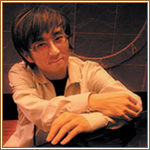 Makoto Kuriya is a revolutionist in Japanese music industry. Basically, he is a jazz piano and keyboard player, but he always has been creating and exploring the possibilities of new style in his music world. When you meet his performances, you will be inspired with enormous enthusiasm. Makoto Kuriya is a revolutionist in Japanese music industry. Basically, he is a jazz piano and keyboard player, but he always has been creating and exploring the possibilities of new style in his music world. When you meet his performances, you will be inspired with enormous enthusiasm.

Kuriya was born in Kobe, Japan, and moved to the United States and enrolled at West Virginia University when he finished high school. Soon after he started new life in a small college town, Morgantown, W V, he was deeply moved by jazz music taken roots in American History. Most of his school days, he devoted on doing local jazz sessions without being recognized by anybody. Kuriya became a busy side-musician and toured with Chuck Manjoine, or with Nathan Davis. Besides these tours, he also performed with a number of Jazz greats such as Arthur Blythe, Chico Freeman, Donald Byrd, James Moody, Toots Thielsman.

After he graduated from West Virginia University with linguistic major, Kuriya relocated to Pittsburgh and taught History of Jazz at University of Pittsburgh. He joined ensemble activities and participated in music festivals and club dates on the East coast including Washington, Baltimore, Philadelphia, Virginia areas. By this time, Kuriya’s well-organized music style was noticed among American jazz musicians.

Just before the twenty-ninth birthday, he recorded five selected originals and two standard songs with Gary Thomas, Steve Wilson, Billy Drummond, Alex Norris and Dave Pellow. This session was later released as "The Baltimore Syndicate" (KICJ-72) and obtained well evaluations by many critics.

Kuriya received "The best pianist" award at Ohio Jazz Competition(1989) and "Westinghouse Award" (1990)

1990, Kuriya was back to Tokyo to keep going his career in Japan. Kuriya has released several trio albums and his unique album series of arrangements for jazz from Japanese animation music, ”ANTITHESE”, etc. In his recent album “Latin Touch”(2003), he created contemporary instrumental music combining jazz, classic, pops, club music etc. Kuriya’s live activities are not limited in jazz, but quite challenging and dynamic such as collaborating with traditional Japanese instrumentalists, classic music players and many other artists.

Looking at the commercial side of his work, Kuriya has done numerous producing, arranging in Jazz/Pop genres and composing works for many vocalists, TV commercials, corporate video productions, movie sound tracks.

http://members.jcom.home.ne.jp/tothemax/

|
| to the top of this page |
 |
 |
 |
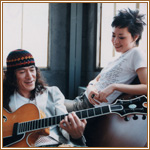 The jazz unit, FRIED PRIDE, comprised of exceptionally talented vocalist Shiho and mesmerizing guitarist Akio Yokota whose techniques are matched by none. The jazz unit, FRIED PRIDE, comprised of exceptionally talented vocalist Shiho and mesmerizing guitarist Akio Yokota whose techniques are matched by none.

In September, 2001, the group made a sensational debut with their first album, “Fried Pride,” as the first Japanese artist ever to release from the prestigious jazz label, Concord. The album brought them the “Golden Disk Awards” hosted by Swing Journal Magazine.

In July 2002, released their second album “Street Walking Woman” where Sheila E. participated on drum & Percussion. The song, “Close To You” had been appointed as the outro of TV Tokyo’s program, “How A Hit Tune Was Born”.

In June, 2003, released their third album, “Heat Wave.” From here, the song “Alfee” became the outro of TBS’s popular weekend program, “Broadcaster”.

And in August, 2004, released their eagerly-awaited fourth album, “That’s My Way”. Numerous artists such as Shuichi ‘PONTA’ Murakami from Japan, and others engaging in Grammy AwardsÅ@and other Grammy Award-Winning artists such as Marcus Miller, Gil Goldstein, and Mike Mainieri from abroad joined in its recording!

Fried Pride also actively conducts live performances!

In Tokyo, their gigs took place at Ebisu Garden Hall, Shibuya Quattro, Roppongi Sweet Basil, Minami Aoyama Cay, and Yokohama Motion Blue; in Nagoya, at Bottom Line, Blue Note, and Jazz In LOVELY; in Osaka, at Pheonix Hall, Blue Note, and Shinsaibashi Quattro; and in Fukuoka, at Blue Note and Ism Hall, and many more at live spots throughout the nation!

http://www.friedpride.com/

|
| to the top of this page |
 |
 |
 |
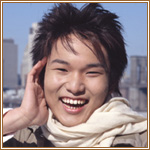 Born on January 27th, 1986, in Ashiya, Hyogo prefecture. Born on January 27th, 1986, in Ashiya, Hyogo prefecture.
Comes in contact with music at age five, where he begun teaching himself to play the piano and organ.
Age 10: Releases his original album "SPAIN", utilizing Hammond B-3.
Age 13: Earns the highest praise from the great jazz pianist, Hank Jones, as being a "standout performance."
Age 15: Gives himself a professional debut recital, "Takashi Matsunaga's professional debut recital".
Age 17: His debut album ,"TAKASHI", released in May, becomes a best-seller and receives numerous coverage. His very first Japan Tour which began from June till July, has been a tremendous success.
In August same year, he participated in Tokyo Jazz 2003. He was garnered a remarkable array of plaudits for both performances, of his own trio and playing together with international superstar performers for Herbie Hancock's "Super Unit".
In October, his own radio show, "Takashi Matsunaga's Jazz for After School-Hours" at Tohoku Radio Station begun.
In November, releases his second album "Moko-Moko", which of all songs are newly written.
In January, won the Jazz Disc Awards (New Star Award) hosted by Swing Journal Magazine.
Age 18: Collaborates with Bobby McFerrin, a Grammy Award Winning Artist, in February. Moreover, Takashi was garnered the "Blooming Flower Awards", the Arts and Cultural Awards hosted by Osaka City.
Releases his second album "Storm Zone", ("Moko Moko" in Japanese) in U.S., in European countries such as England and German, etc., and in numerous Asian countries. He set a record for becoming the youngest leader ever to record for the Blue Note Label in its history of 65-years.
In March, received Idemitsu Music Awards.
Takashi will soon appear on TV commercial for NTT Docomo Kansai.

http://www1.odn.ne.jp/takashi-m/ |
|
to the top of this page
|
 |
 |
 |
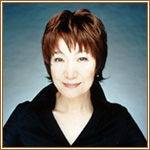 Born in Tokyo, in 1948, as the oldest daughter of Hisashi Moriyama, the pioneer in the Japanese jazz scene. Born in Tokyo, in 1948, as the oldest daughter of Hisashi Moriyama, the pioneer in the Japanese jazz scene.

Makes her debut with "A Field Full of Love (Kono Hiroi Nohara Ippai)" in 1967.
Subsequently, releases numerous hit tunes including the million-seller single "Forbidden Love (Kinjirareta Koi)". Ryoko's clear tone of voice and skill as a vocalist allows her to be true to her name of being one of the greatest singers in Japan. She continues to perform internationally in places such as Carnegie Hall in New York, Frankfurt, Seoul, and in Los Angeles, and does not limit her stage only within Japan.

Her CD album produced as her 35th Anniversary, "A Field of Sugar Canes (Satou Kibi Batake)" released in March, 2002, is a longtime seller even today. In the same year, Ryoko won the Best Vocalist Award and Gold Prize for "A Field of Sugar Canes (Satou Kibi Batake)" as well as Lyrics Award for "Nothing But Tears (Nada Soso)" at the 44th Japan Record Awards, notching up the triple crown.

In May, this year, she conducted her tour "Ryoko Moriyama US Jazz Live Tour 2004" with her original band member, Ken Shima's band at various sites in U.S. such as the prestigious Blue Note in New York, bringing along her jazz album "The Jazz Singer" released in the previous year. At Blue Note in New York, she played together with Michael Brecker who also took part in the recording of her album, and enjoyed a real good reputation there.

http://www.ryoko-moriyama.jp/ |
| to the top of this page |
 |
|
 |
 |
 |
|
|


